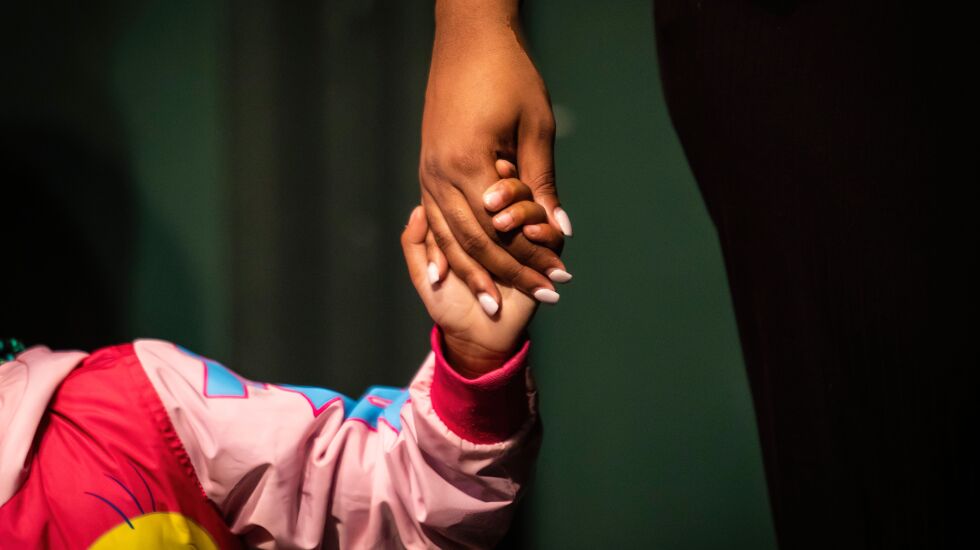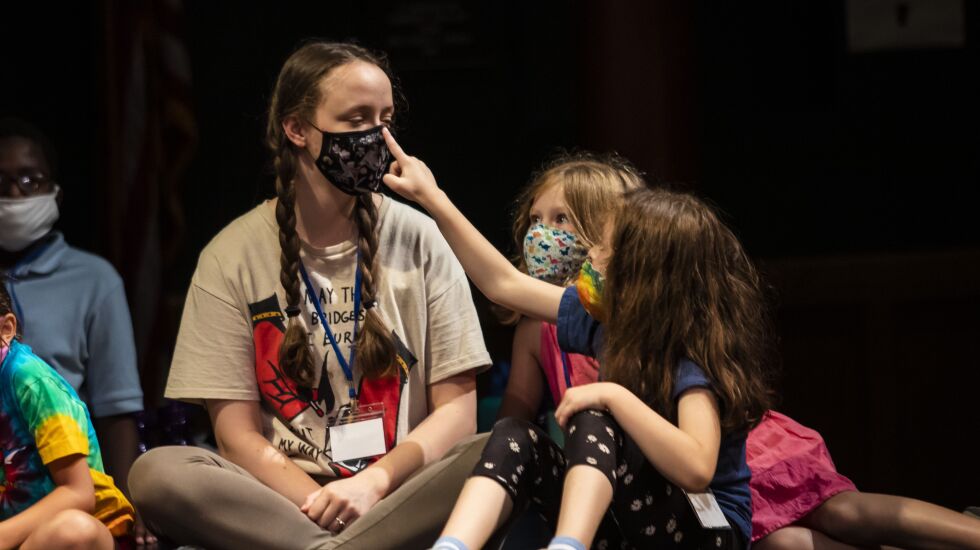
Davion isn’t on stage with the other kids, talking, stretching, being put through their morning paces at the Vittum Theater.
Instead he’s lying on the floor by the lobby door, silent, alone, facing the wall. But that’s OK. Camp director Sarah Illiatovitch-Goldman gently coaxes the 6-year-old to his feet.
“Come with me,” she urges, “I need you with me.” She guides Davion into the auditorium. He dives into a seat, drawing his knees up against his lips, watching.
In front of him on stage are three dozen kids, warming up, rolling their shoulders. From diverse backgrounds — boys, girls, at least one non-binary child, ages 6 through 10. City and suburbs. Black and white, from across the economic spectrum.
But they share one hard reality that has upended their young lives and sent them here, to Hearts to Art, a two-week summer camp for children with parents who have died.
Now in its 18th year, applications are way up. The program, mixing creative arts and counseling, is run by the Auditorium Theatre and held at the Vittum. The theater, in Chicago’s West Town neighborhood, is part of Northwestern University’s Settlement House.
“This year we had a record number,” Illiatovitch-Goldman says. “The amount of loss is bigger.”
Both in Chicago and across the country. A study in Pediatrics last year estimated one in four COVID-19 deaths — 250,000 and counting — cause a child to lose a parent or caregiver. Between illness, accident and violence, an estimated 3.5% of children in America have a parent die before the age of 18. A 2-year-old boy lost both parents in the Highland Park 4th of July shooting.
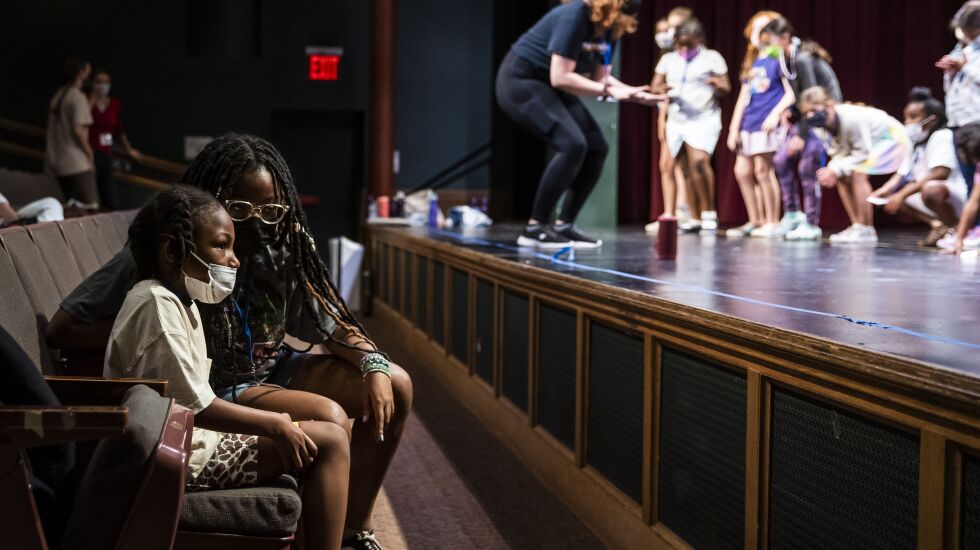
Such children tend to feel isolated in classrooms with kids whose parents are living, kids happily drawing their Mother’s Day cards, creating a void that must be filled with comfort and encouragement.
“If children are not given a supportive environment to express themselves or share their story, connect with that [deceased] person, there can be a higher chance of acting-out behavior — maybe dropping out of school can be increased, substance abuse, even an increase in suicide,” said Lauren Raney, program director and registered art therapist at Willow House, which runs childhood bereavement programs in Arlington Heights, Libertyville and Chicago.
It is a realm of life many seldom pause to consider.
“A lot of people are nervous about death and dying, when really camp is full of laughter, full of joy,” said Raney. “It has these bittersweet moments, of course. Tears and sadness. But connecting with the person who has died through art is such a beautiful experience.”
Yet such programs are rare. Hearts to Art operates only four weeks in the summer — there is a second two-week session for older children, 10 to 14.
“I wish they were available throughout the school year,” said Raney. “Other than us and Buddy’s Place in Western Springs, we’re kind of the three main grief support organizations at the moment. There’s not enough programs out there; there needs to be more.”
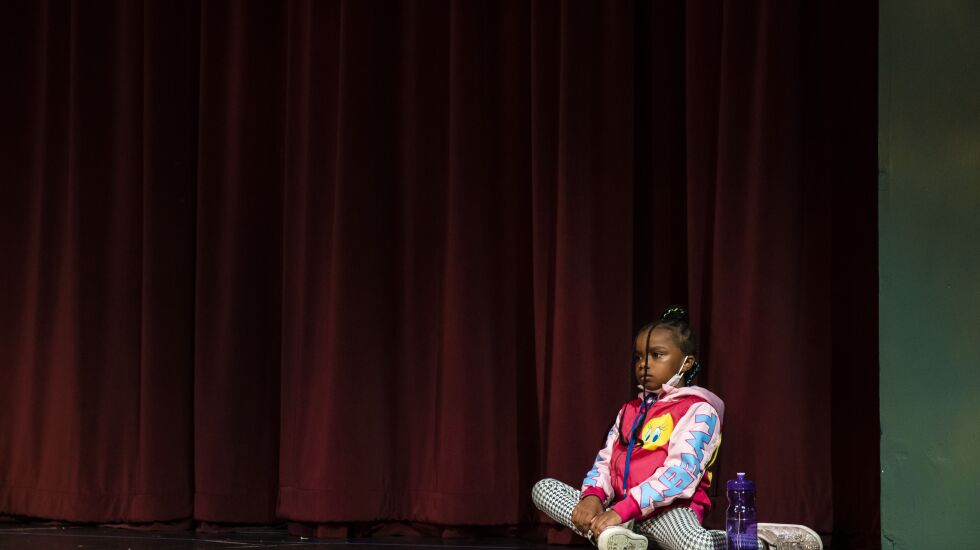
One sticking point is staffing. The employment crunch is particularly severe in social services. Catholic Charities helps about a thousand troubled youth — facing parental loss and other issues— across Cook and Lake counties, and could help hundreds more right now if only they could fill job vacancies.
“We just don’t have the workforce,” said Hector Rivera, senior program director of child, youth and family counseling services for Catholic Charities.
As a result, kids in need are turned away.
“We have long waiting lists,” Rivera. “Some, three months. Some, six months. We have one program, it’s a yearlong [wait] right now. We felt that ethically we needed to put a pause on putting youth on that waiting list, because it wasn’t fair to them. “
They’re all looking for counselors, and skilled youth leaders like theater teacher Chazie Bly.
“We’re all going to take a tableau!” Bly announces, deftly managing the 30 kids onstage at Vittum. “I’m going to play the museum guard who’s watching this. While you all freeze in a tableau based on a theme that you will choose. If I catch you moving, you must melt to the ground. . . All right everyone, pick a section of stage, arms out!”
The kids choose dinosaurs.
“Strike a dinosaur pose in five, four, three, two, one!” Bly enthuses, then tries to break their concentration.
“What sort of dinosaur are you?” he asks Lizzette, 6, who stands frozen.
“This one is the real deal,” he tells the group, in admiration.
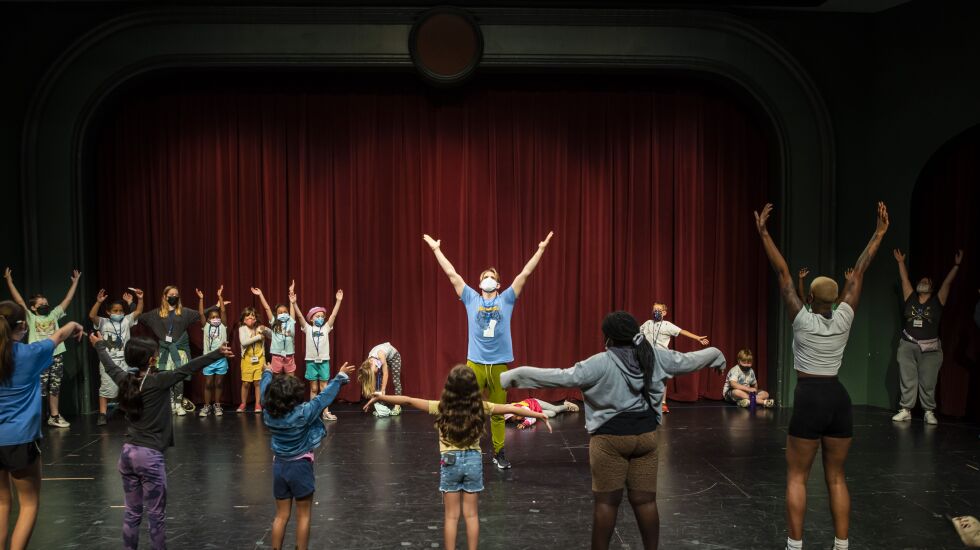
Even when not playing, however, Lizzette has a somber, thousand-yard stare that stands out. While most kids are laughing and clapping, she will stand, motionless, her face blank. She’s says she’s tired.
The game on stage dissolves in laughter, applause, general commotion.
The only ground rule to visitors is that campers shouldn’t be asked about their loss.
“A lot of recent stuff has happened,” is the closest anyone will say. Davion sits gazing at the other kids having their fun.
What’s camp like?
“Chickens,” Davion says, enigmatically.
Is “chickens” good or bad?
“Good,” he replies. “If I say ‘good chickens’ that means good. If I say ‘bad chickens’ that means bad.”
Despite camp being good chickens, he isn’t getting on stage.
“I don’t want to do it,” he announces. “It’s boooooooring.”
“Davion, they’re doing another round,” Illiatovitch-Goldman asks. “Do you want to try?”
“No no no.”
“OK.”
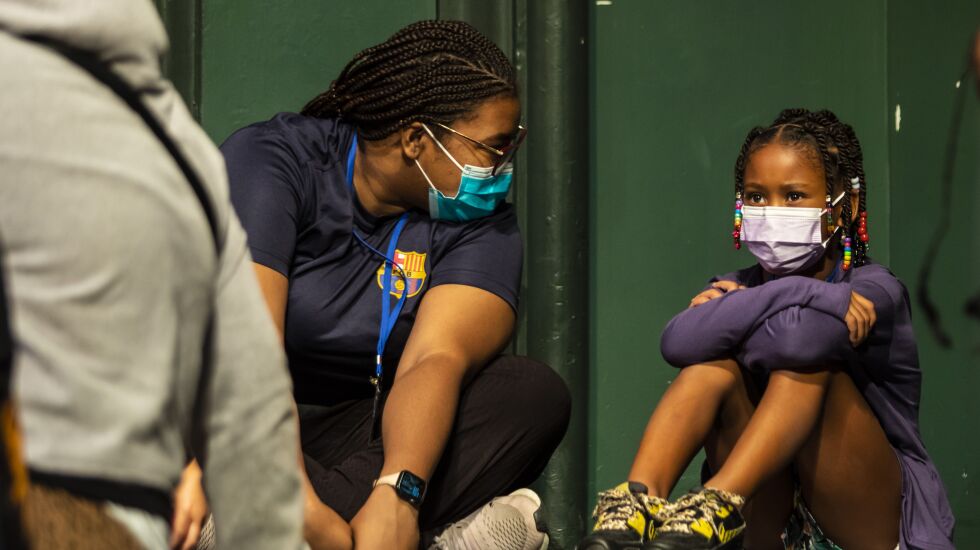
Illiatovitch-Goldman takes the stage, for some announcements. Today is Monday, the beginning of the second week.
“My heart was exploding, you are all so beautiful and brilliant,” she begins. “Before we get into camp song and dance, let’s do a five-finger check-in. Let’s see where we are this morning. On a scale of five, one being the worst, five being the best, let’s see where we are, friends? I see some zeroes, I see some threes, I see pretty much every number. OK, so that’s cool, that’s totally fine, throwing you some love if you need it. Remember we have people to talk to if you want, one on one. We’ve got lots and lots of support.”
While she talks, three girls sit close to group leader Grace Law, holding her hands, draping themselves across her, touching her nose.
“When you lose someone, sometimes you just need that little extra touch, or that little extra piece of love,” says Law, 24, who lost her dad two weeks after her 11th birthday, the same year she started at Hearts to Art. “I remember when I was a camper, that physical touch is what made this place feel safe.”
When former campers, like Law, return as leaders, their experiences help them be sensitive to what campers are going through.
”I remember my first day at camp, I told my mom, ‘I’m not coming here, I’m not going to talk, I don’t want to be at a camp,’” says Law, now a student at the University of North Carolina-Wilmington. “‘I want to be normal, I want to be a normal kid, I want to pretend that my dad didn’t die.’ And then, all of a sudden we played a game, and it all switched, and I realized: I’m not alone. Neither are these campers. ... This camp changed my life. It saved my life, and I feel like it saves a ton of people’s lives. I don’t know where I would be without this place.”
It would be too pat to conclude a visit with Davion on stage, energetically participating — which he does. Or to observe that Lizzette, asked how camp is, offers a shy thumbs-up. The loss of a parent is permanent, a hole that must be grappled with forever.
”It’s really scary, when your parent dies, there’s just this empty hole, and you have to grow up,” says Law. “The second that happens, part of your childhood ends. That’s one reason this camp is amazing, because you get that part of your childhood back.”
